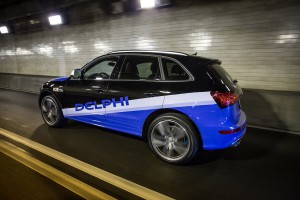Detroit-based mega-supplier Delphi is teaming up with BlackBerry Ltd., the Canadian company best known for its once-ubiquitous smartphones, to develop the underlying software needed to put autonomous and driverless vehicles on the road.
Once the auto parts unit of General Motors, Delphi has been rapidly shifting away from traditional, mechanical parts to focus on high-tech automotive systems. It already has developed a self-driving system called CSLP that could put it in direct competition with the likes of Google spinoff Waymo.
But at a briefing at its suburban Detroit headquarters Wednesday, Glen De Vos, Delphi’s Chief Technical Officer said that the “incredibly complex” technology needed for tomorrow’s cars makes it difficult “to do this alone. We need partners.”
BlackBerry once dominated the smartphone market but saw that business dry up as it was challenged by Apple’s iPhone and various competitors using Google’s Android operating system. Today, it focuses on what it describes as “mobile-native security software and services.” Its BlackBerry QNX unit has been gaining significant business in the auto industry, winning kudos for developing the latest version of Ford’s Sync 3. Earlier versions of that infotainment system, developed by Microsoft, had been responsible for a flood of complaints.
(Ford inks deal with BlackBerry to use QNX software. For the story, Click Here.)
As part of the new partnership, BlackBerry will focus on boosting the performance of Delphi’s self-driving software, with an emphasis on safety and security. Cybersecurity is considered one of the biggest concerns facing the auto industry as it adds more electronic hardware and software to its vehicles – and that will become even more important as the first autonomous and driverless vehicles take to the road.
“There is no safety without security,” said John Wall, SVP and GM of BlackBerry QNX, who participated in the news conference by conference call. “With cyberattacks and threats to connected vehicles on the rise, it is imperative that auto manufacturers are provided with software that is safety certified, reliable and secure.”
Virtually every major automaker – and many smaller manufacturers – are working to develop self-driving vehicles. In the long-run, analysts believe many will wind up turning to suppliers like Waymo or Delphi. The latter firm is already running a small fleet of prototypes out of its Pittsburgh development lab and expects to begin ride-sharing fleet tests in 2021. The goal is to “take the driver out” of the vehicle entirely by 2020, De Vos said.
Like many in the autonomous world, Delphi is betting that commercial users, such as ride-sharing fleets Uber and Lyft, will provide the primary market for fully driverless vehicles, at least initially, due to the significant cost of the technology. But by eliminating the driver, Uber has predicted it will be able to lower the cost of a ride to the point where it will become significantly cheaper to use the service than to own a personal vehicle.
(Click Here for details about Delphi’s partnership with Innoviz.)
The hefty cost of developing self-driving vehicle technology has led to a number of new partnerships not only paying erstwhile automotive competitors but ride-sharing services and tech companies. Delphi has also partnered up with Mobileye, the Israeli-based mobile vision firm purchased by Intel last March for $15.3 billion.
During its Wednesday news conference, Delphi also offered a look at its new alliance with start-up Renovo. The Silicon Valley firm is developing ways for Delphi’s autonomous technology to integrate with vehicles using old-style electrical architectures.
That is a challenge that poses a potential speedbump for the industry. Conventional wiring systems link as many as 100 different microprocessors and often creak at the seams when adding new devices. They generally operate at speeds measured in megabytes per second, while all the data needed to let tomorrows cars operate autonomously will need to flow by the terabytes, or as much as 1 million times faster.
While some carmakers are migrating to new, faster electrical architectures, notably Tesla, it will take a decade or more for many manufacturers to catch up, warned De Vos.
(Delphi, Transdev plan to launch driverless “mobility on demand service.” Click Here for the details.)
“Automakers aren’t going to throw away everything they’ve done,” said Chris Heiser, Renovo’s co-founder and CEO, so the company is developing ways to make old and new systems work together.

